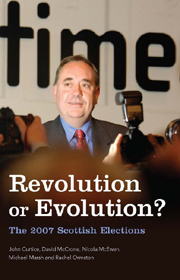Book contents
- Frontmatter
- Contents
- List of Tables
- Preface
- CHAPTER 1 A Watershed Election?
- CHAPTER 2 A Distinctive Scottish Voice? Identities, Values and Attitudes
- CHAPTER 3 What has Devolution Achieved? The Public's View
- CHAPTER 4 Governing Scotland: The People's Preferences?
- CHAPTER 5 Lost Labour Votes? Records, Personalities and Issues
- CHAPTER 6 How the SNP Won
- CHAPTER 7 Do Voters Care about Parties Any More?
- CHAPTER 8 A Personal Vote? How Voters Used the STV Ballot
- CHAPTER 9 Conclusion
- Technical Appendix
- Index
CHAPTER 8 - A Personal Vote? How Voters Used the STV Ballot
Published online by Cambridge University Press: 12 September 2012
- Frontmatter
- Contents
- List of Tables
- Preface
- CHAPTER 1 A Watershed Election?
- CHAPTER 2 A Distinctive Scottish Voice? Identities, Values and Attitudes
- CHAPTER 3 What has Devolution Achieved? The Public's View
- CHAPTER 4 Governing Scotland: The People's Preferences?
- CHAPTER 5 Lost Labour Votes? Records, Personalities and Issues
- CHAPTER 6 How the SNP Won
- CHAPTER 7 Do Voters Care about Parties Any More?
- CHAPTER 8 A Personal Vote? How Voters Used the STV Ballot
- CHAPTER 9 Conclusion
- Technical Appendix
- Index
Summary
We established in the previous chapter that while the bonds of party appear to be looser than they once were, it is uncertain whether they are sufficiently weak to ensure that voters will have exploited the opportunities to express a more nuanced and more candidate-centred vote provided by the introduction of the single transferable vote (STV) in 2007. At the same time, we have learnt to be aware of the possibility, however remote, that voters' ability to use a more complex voting system may be compromised by lack of knowledge or confusion about how to complete the ballot paper or how the electoral system works. In this chapter, therefore, we examine the apparent incidence of more nuanced and candidate-centred behaviour in the way voters completed the STV ballot paper in the 2007 local elections. In so doing we try to establish how far such behaviour seems to be the product of a relative disregard for party politics rather than ignorance or confusion about the system, while also taking into account the impact of the circumstances in which voters were asked to cast their votes – that is, the choices voters were offered. We also consider the partisan consequences of the patterns we uncover. In doing so we will compare our findings with similar research on how people behave in parliamentary elections in the Republic of Ireland (Marsh et al., 2008), where, as we noted earlier, candidate-centred voting appears to be relatively commonplace.
We are particularly interested in behaviour that indicates an apparent willingness to exploit the opportunities for more nuanced and more candidate-centred behaviour (Marsh, 2007).
- Type
- Chapter
- Information
- Revolution or Evolution?The 2007 Scottish Elections, pp. 158 - 181Publisher: Edinburgh University PressPrint publication year: 2009



